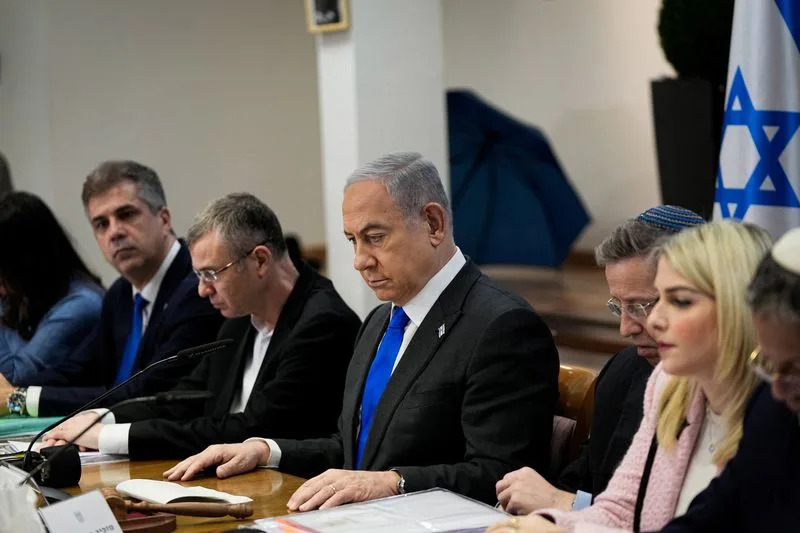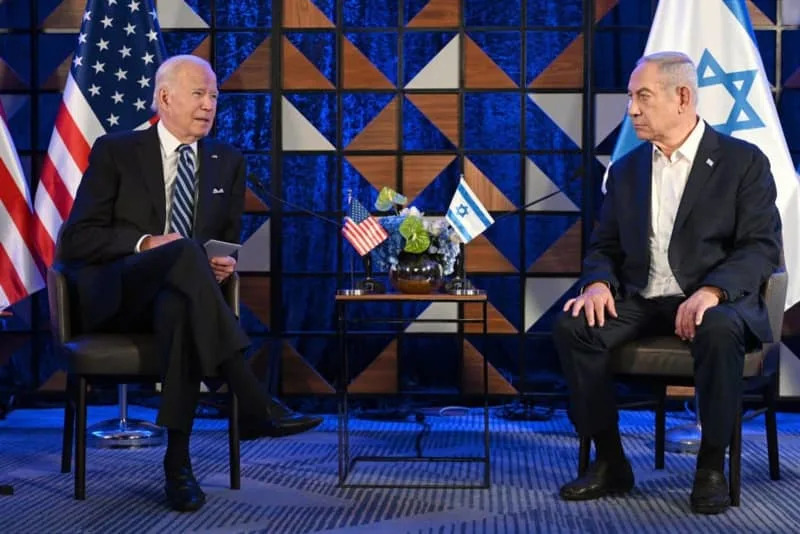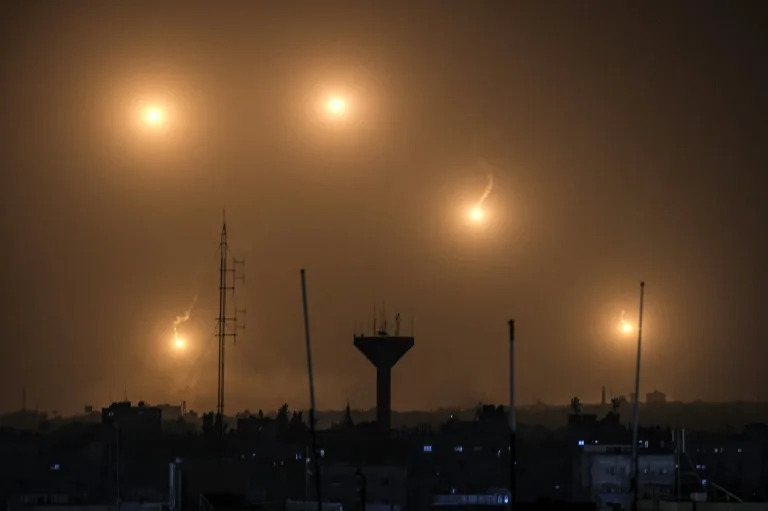Israeli Prime Minister Benjamin Netanyahu dismissed reports that the United States had convinced Israel not to expand its military activity during a weekly cabinet meeting on Sunday.
"I have seen false publications claiming that the U.S. prevented and is preventing us from operational operations in the region," Netanyahu said, without elaborating on the reports. "This is not true. Israel is a sovereign state. Our decisions in the war are based on our operational considerations, and I will not elaborate on that."
The Wall Street Journal on Saturday reported that Netanyahu was persuaded by U.S. President Joe Biden not to attack the militant Hezbollah group in Lebanon out of concerns it would launch an attack on Israel, similar to the Oct. 7 rampage by Hamas in Gaza on Israel's southern communities.
Netanyahu insisted on Sunday that Israel's actions are "not dictated by external pressures."
"The decision on how to use our forces is an independent decision of the IDF and no-one else," Netanyahu said.
Biden talks with Netanyahu about military action in Gaza
President of the USA, and Benjamin Netanyahu, Prime Minister of Israel, sit together for talks during their meeting..
US President Joe Biden has spoken with Israeli Prime Minister Benjamin Netanyahu about the military operation in the Gaza Strip, the White House announced on Saturday.
The leaders discussed the "objectives and phasing" of the Israeli military campaign, the White House said following the meeting.
The US government has been stressing the need for more targeted military activities by Israel in the Gaza Strip, focusing on the leadership of Hamas, which was responsible for the October 7 attack on Israel that triggered the war.
US Secretary of State Antony Blinken said a few days ago that if this were to happen, the number of civilian casualties would also fall.
In the telephone conversation with Netanyahu, Biden emphasized that the civilian population including humanitarian volunteers must be protected at all costs, the White House said.
It was important to allow "civilians to move safely away from areas of ongoing fighting," the statement added.
The White House further said that Biden and Netanyahu had discussed the importance of securing the release of all remaining hostages.
Biden says he did not ask for cease-fire in call with Israel’s Netanyahu
President Biden said that he did not ask Israeli Prime Minister Benjamin Netanyahu to negotiate a cease-fire in the country’s war with Hamas during a call Saturday, despite rising pressure to do so.
Biden told reporters that he had a “long talk” with Netanyahu, not discussing its contents, later adding that he did not ask for a cease-fire.
The international community has nearly unanimously urged the U.S. and Israel to push for a cease-fire in Gaza, as the Palestinian death toll from the Israeli military offensive rises.
Over 20,000 Palestinians have died in the war, Gaza health officials said, and nearly the entirety of Gaza’s 2.3 million population is in dire need of humanitarian aid, according to the United Nations.
In a U.N. vote last week, just eight countries joined Israel and the U.S. in voting against a cease-fire resolution, and the U.S. abstained on a U.N. Security Council vote Friday on Gaza aid after negotiating for days to water down the measure.
Within the U.S., a rising number of lawmakers and members of the public have also called on the Biden administration to change its Israel policy.
A half dozen moderate Democrats urged the administration to step up pressure on Israel to end its all-out ground offensive on Gaza this week in a letter to the president.
“We are deeply concerned by [Netanyahu’s] current military strategy in Gaza. The mounting civilian death toll and humanitarian crisis are unacceptable and not in line with American interests; nor do they advance the cause of security for our ally Israel,” the letter reads.
“We also believe it jeopardizes efforts to destroy the terrorist organization Hamas and secure the release of all hostages,” the lawmakers continued.
American support for military aid to Israel among the public has also waned since the start of the war in early October.
Gaza war rages on Christmas Eve as Biden urges caution
Israel pushed on Sunday with its military campaign to destroy Hamas over the October 7 attacks, as the focus of the deadly combat shifted to southern Gaza where most displaced Palestinians are trapped.
US President Joe Biden stressed the "critical need" to protect civilians, in a call with Prime Minister Benjamin Netanyahu, who vowed Israel would "continue the war until all of its goals have been achieved", officials said.
As heavy fighting raged on, the Israeli army said it had struck another 200 targets in the past 24 hours in the besieged Palestinian territory where it is seeking to defeat Hamas and free remaining hostages.
The army said 153 troops had died in Gaza since it launched its ground invasion on October 27. Ten soldiers were lost in battles on Saturday, one of the deadliest days for the Israeli side.
"This is a difficult morning, after a very difficult day of fighting in Gaza," said Netanyahu. "The war is exacting a very heavy price... but we have no choice but to keep fighting."
The army said soldiers had raided a northern Gaza compound near schools, a mosque and a clinic and found "explosive belts adapted for children, dozens of mortar shells, hundreds of grenades and intelligence documents".
Hamas rejected those claims as lies meant "to justify their massacring of innocent civilians and their destructive aggression that has affected the entire infrastructure... in the already blockaded Gaza Strip".
The bloodiest ever Gaza war broke out when Hamas attacked southern Israel on October 7 and its Islamist militants killed about 1,140 people, mostly civilians, according to an AFP tally based on Israeli figures.
The gunmen also seized around 250 hostages, 129 of whom are believed to remain in Gaza following the exchange of captives for Palestinians prisoners during a week-long truce late last month.
Israel's withering military campaign, including massive aerial bombardment, has killed 20,424 people, mostly women and children, according to the Hamas-run territory's health ministry.
Vast areas of Gaza lie in ruins and its 2.4 million people have endured dire shortages of water, food, fuel and medicine due to an Israeli siege, alleviated only by the limited arrival of aid trucks.
Eighty percent of Gazans have been displaced, according to the UN, many now shielding against the winter cold in makeshift tents and forced into the south of Gaza even as ground fighting comes closer.
Near the far southern Gaza city of Rafah, Umm Amir Abu al-Awf, 27, suffered wounds to her hand and legs in a strike on her house early Sunday.
"Who won?" she said. "Nothing has been achieved except killing civilians... They keep saying Rafah is safe. It is not safe. Nowhere is safe. Every house has a martyr and injured."
- 'More hatred, less peace' -
Israeli military spokesman Jonathan Conricus indicated that forces were close to gaining operational control in northern Gaza and that now "we focus our efforts against Hamas in southern Gaza".
Fighting has raged in the main southern city of Khan Yunis, the birthplace of Yahya Sinwar, Hamas' leader in Gaza and the man Israel holds most responsible for the October 7 attack.
Elsewhere, Palestinian rescuers scrambled again to pull survivors and bodies from the rubble of a destroyed residential building, after a strike hit in the central city of Deir al-Balah.
"I was praying when a huge explosion occurred," said Yazan Moqbel, a wounded man whose sister was still under the broken concrete. "Rubble fell on us. I didn't know what happened."
The head of the UN refugee agency, Filippo Grandi, urged an end to the suffering in the third month of the war.
"For aid to reach people in need, hostages to be released, more displacement to be avoided and above all stop the appalling loss of lives, a humanitarian ceasefire in Gaza is the only way forward," he wrote on X, formerly Twitter.
"War defies logic and humanity, and prepares a future of more hatred and less peace."
On Friday, the United States allowed the passage of a UN Security Council resolution that effectively called on Israel to allow "immediate, safe and unhindered" deliveries of life-saving aid to Gaza "at scale".
World powers had wrangled for days over the wording and, at Washington's insistence, toned down some provisions -- including removing a call for a ceasefire.
One displaced Gazan, Ahmad al-Burawi, now living in Rafah in southern Gaza, said: "We just want to return to our lands, that's all. We want a solution... People are dying."
- Silent Christmas -
As the war rages on, Christians around the world celebrate Christmas Eve, and festivities are usually held in the occupied West Bank city of Bethlehem where they believe Jesus was born.
But this year the city is almost deserted, with few worshippers around and no Christmas tree erected, after church leaders decided to forego "any unnecessarily festive" celebrations, in solidarity with Gazans.
Palestinian president Mahmud Abbas voiced hope Christmas would mark "a cessation of the Israeli war against the Palestinian people in Gaza, as well as across the occupied Palestinian territories".
The Gaza war has heightened tensions across the Middle East, where Israel faces a range of enemies -- Iran-backed armed groups in Lebanon, Syria, Iraq and Yemen that have voiced strong support for Hamas.
Cross-border fire has erupted almost daily between Israel and Lebanon's powerful Hezbollah movement.
And Yemen's Huthi rebels have fired at cargo vessels in the Red Sea, leading the United States to build a naval taskforce to deter the missile and drone strikes.
The US military said four drones had targeted the USS Laboon, but had been shot down, and that an Indian-flagged tanker was hit and sent out a distress call.
Iran's deputy foreign minister, Ali Bagheri, denied the Islamic republic was orchestrating the campaign, saying the Huthis act on their "own decisions and capabilities".
British Foreign Secretary David Cameron, in an interview published Sunday, branded Iran "a thoroughly malign influence in the region and in the world".
Biden presses Netanyahu on protecting civilians in Gaza: W. House.
A view from Rafah shows flares fired by Israeli soldiers over Khan Yunis in southern Gaza on December 22, 2023
President Joe Biden on Saturday pressed Israeli Prime Minister Benjamin Netanyahu to protect civilian lives in Gaza, the White House said, as the country's forces mounted fresh military strikes in the territory.
The conversation came a day after the UN Security Council passed a resolution demanding "safe and unhindered delivery of humanitarian assistance at scale," though it stopped short of calling for a ceasefire between Israel and Hamas militants.
"The President emphasized the critical need to protect the civilian population including those supporting the humanitarian aid operation, and the importance of allowing civilians to move safely away from areas of ongoing fighting," the White House said in a statement.
Biden told reporters at the White House earlier in the day that he had a "long talk" with Netanyahu, which he described as "a private conversation."
In response to a follow-up question, Biden said, "I did not ask for a ceasefire."
The White House statement said the two leaders discussed the "objectives and phasing" of Israel's military campaign as well as the importance of securing the release of all remaining hostages.
On October 7, Hamas militants streamed across the Gaza border and attacked southern Israeli communities, killing about 1,140 people, mostly civilians, according to an AFP tally based on official figures.
Israeli authorities say 129 of the hostages seized during the brazen attack remain in Gaza.
Israel responded with a blistering assault on Gaza that has killed at least 20,057 people, most of them women and children, according to the health ministry in the Hamas-run territory.
A truce last month saw the release of 105 hostages, including 80 Israelis freed in exchange for 240 Palestinians held in Israeli prisons.
Friday's much-delayed UN resolution came after days of diplomatic wrangling, and sidestepped a US veto only by avoiding a call for a ceasefire. Both the US and Russia abstained on the measure.
UN Secretary-General Antonio Guterres said a "humanitarian ceasefire" is the only way for aid "to be effectively delivered."
It ratchets pressure on Israel to allow greater humanitarian access and gives the United Nations a bigger role in coordinating the delivery of aid into Gaza.
The UN estimates the fighting has displaced 1.9 million of Gaza's 2.4 million population.
Israel's foreign minister said his country would "continue to screen all humanitarian aid to Gaza for security reasons."





